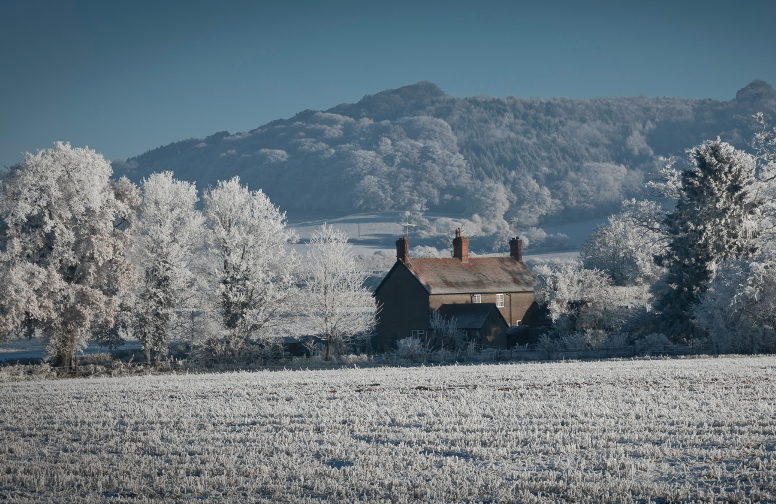I’ll come to the seasonal song of my title in a moment, but let’s begin with another one, courtesy of John Lennon – “So this is Christmas, and what have you done…?”
Well, in 2020 I published a book, wrote 34 blog posts, did my bit to help nurture our little community of 4.5 households on our site through another year, spoke as widely as I could about the need to rethink the global political economy, sat on committees dedicated to widening access to farmland, managed to dodge Covid-19 (while remembering those who didn’t), donated to charity and even managed to grow a little food and fibre on our site – but the truth is that it wasn’t anywhere near enough in the face of the crises we face, and I played pretty much the same role as everyone else in the wealthy countries in overburdening the Earth’s limited capacities. So next year I will have to try harder.
One way I’ll try harder is by taking a few more small steps to increase my food and fibre self-reliance. But first I’m going to take some downtime over Christmas. The other households on our site are decamping to visit their families, and I’ll be here cooking, eating and making merry with mine. I’ll eat food that we grew here on the farm, and I’ll warm myself by the woodstove burning logs from trees that I planted, felled, cut, split and stacked myself. And perhaps I’ll have a glass or two of the beech noyau I made this year, using leaves from trees I planted myself (OK, so the sugar and gin were imported – small steps, remember…)
Family. Autonomy. The simple pleasures of home and farm. It’s my honouring of such ‘petty bourgeois’ things that prompted the only largely negative review of my book that I’ve seen so far, by the Marxist critics I mentioned a couple of posts back. The review badly mischaracterized many of my arguments, but on the upside the petty bourgeois jibe sent me back to the inestimable James Scott, who’s always worth a read. In his essay “Two cheers for the petty bourgeoisie”, Scott writes:
“The petite bourgeoisie and small property in general represent a precious zone of autonomy and freedom in state systems increasingly dominated by public and private bureaucracies …. the desire for autonomy, for control over the working day and the sense of freedom and self-respect such control provides is a vastly underestimated social aspiration for much of the world’s population”1
…and, I’d add, also a vastly underestimated basis for trying to build a tolerable future for ourselves in the face of climate change, resource constraint and political decay.
I’m not really convinced that the concept of the petty bourgeoisie has much traction in analyzing the political challenges and conflicts now facing us. Still, James Scott suggests that the characteristics of unheroic autonomy, freedom and mutuality often attached to notions of the petty bourgeoisie are fundamentally anarchist sensibilities – and on that basis I’m prepared to predict that if the challenges of our times are met successfully through class revolutions of any kind in the future, they’ll most likely be in the form of ‘petty bourgeois’ anarchist revolutions embarrassing to the rigidities of orthodox Marxist class analysis.
Anyway, the review at least provides a useful foil for a few arguments that I aim to unfurl in blog posts next year. One of them concerns the dangers of domination in human relationships of all kinds, not just in families, which was brought home to me rather ironically while my critics were lambasting me with wild allegations about my supposed enthusiasm for the ‘patriarchal family’, just as various non-kin collectivities on my personal radar were aflame with troublesome power dynamics. My critics’ special antipathy to family relationships also rather reminds me of words attributed to the man whose birth I shall shortly be celebrating, alongside my family: “If any man come to me, and hate not his father, and mother, and wife, and children, and brethren, and sisters, yea, and his own life also, he cannot be my disciple” (Luke 14: 26). Next year, I hope to trace this curious affinity between currents of both Marxism and Christianity and suggest some ways in which it might be wise to try to reconfigure them. The trick is in the tension – but not the dialectic! – between the local and the non-local, the public and the private, the self-critical and the self-honouring.
Another argumentative foil is in trying to think through the field of politics in a future world of supposedly ‘petty bourgeois’ smallholders. This is the field of agrarian populism, where both the greatest challenges and the greatest opportunities lie in the fact that so few of ‘the people’ in so many countries today are agrarians. How to reckon with that is a major conundrum – but not one that 19th century-style class analysis is equipped to grasp.
Anyway, we’ll come on to all this next year, I hope. In the meantime, I’m going to count my blessings – the wonderful food, farm and family I have, the other wonderful people and non-human organisms I share the farm with, the wonderful wider communities I’m a part of (including the online ones), and the wonderful reception that my book has (mostly) got. So let me raise a glass to you in this holiday season, wherever you are and whichever kin, non-kin or other beings you’re keeping company with, to wish you peace and (a modest, sustainable and semi-autonomous) prosperity. Thank you for reading this blog. And if Christmas is a thing for you, I hope you’ll have yourself a merry little agrarian populist Christmas. Because next year, there’s work to do…
Notes
- James Scott. 2012. Two Cheers for Anarchism. Princeton University Press, p.85.
Photo by Craig Cooper on Unsplash






